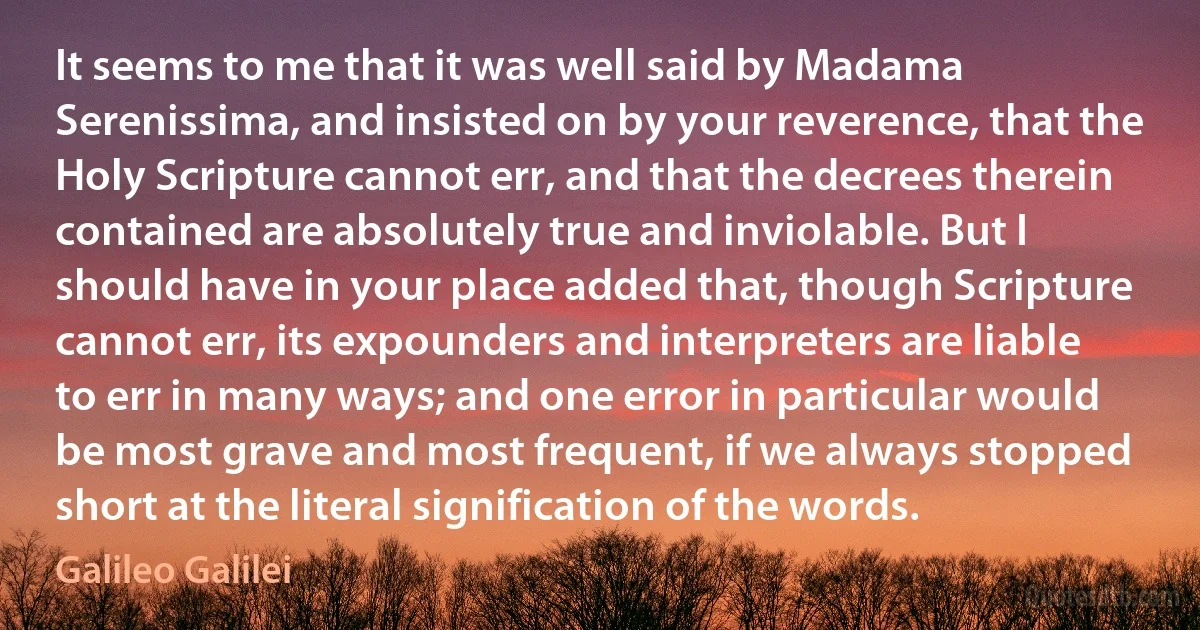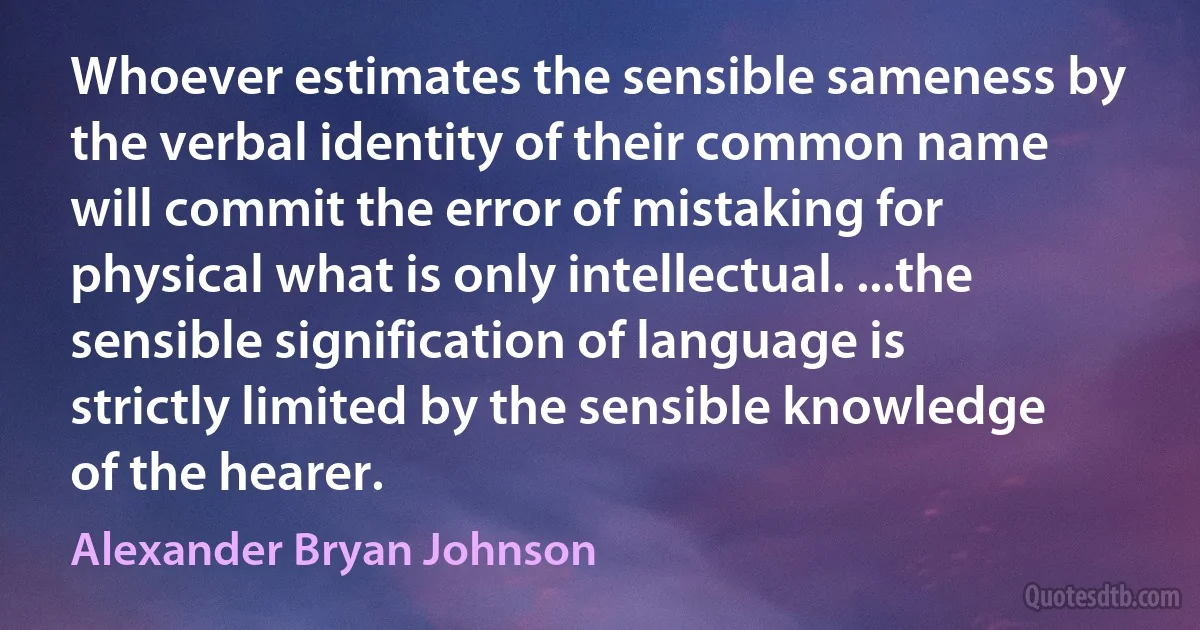Signification Quotes
Since reasoning, or inference, the principal subject of logic, is an operation which usually takes place by means of words, and in complicated cases can take place in no other way: those who have not a thorough insight into both the signification and purpose of words, will be under chances, amounting almost to certainty, of reasoning or inferring incorrectly.

John Stuart Mill
It is a great mistake that the country can only be either a Dar-ul-Islam or a Dar-ul-Harb in the primary signification of the words, and that there is no intermediate position. A true Dar-ul-Islam is a country which under no circumstances can be termed a Dar-ul-Harb and vice versa. There are, however, certain countries which, with reference to certain circumstances, can be termed Dar-ul-Islam, and with reference to others Dar-ul-Harb. Such a country is India at the present moment... If you have power, jihad is incumbent upon you. If you do not have power, it is unlawful.

Syed Ahmed Khan
Rather than protecting music as a sublimely meaningless activity that has managed to escape social signification, I insist on treating it as a medium that participates in social formation by influencing the ways we perceive our feelings, our bodies, our desires, our very subjectivities - even if it does so surreptitiously, without most of us knowning how. It is too important a cultural force to be shrouded by mystified notions of Romantic transcendence.

Susan McClary
Surrealism will at least have served to give experimental proof that total sterility and attempts at automatizations have gone too far and have led to a totalitarian system... Today's laziness and the total lack of technique have reached their paroxysm in the psychological signification of the current use of the college.

Salvador Dalí
Truly, though kingship be not a title but a name of office that runs through the law, yet it is not so ratione nominis, but from what is signified. It is a name of office, plainly implying a Supreme Authority. Is it more, or can it be stretched to more? I say, it is a name of office, plainly implying the Supreme Authority, and if it be so, why then I would suppose, (I am not peremptory in any thing that is matter of deduction or inference of my own,) why then I should suppose that whatsoever name hath been or shall be the name, in which the Supreme Authority shall act; why, (I say) if it had been those four or five letters, or whatsoever else it had been, that signification goes to the thing. Certainly it does, and not to the name. Why then, there can be no more said, but this, why this hath been fixt, so it may have been unfixt.

Oliver Cromwell
The so-called pejorative tendency has yet another cause. It is in the nature of human malice to take pleasure in looking for a vice or a fault behind a quality. The French have the adjective prude, which had formerly a good and noble acceptation, since it is the feminine of preux. But the spirit of the narrators (perhaps also some feeling of rancour against the loftier virtues) turned this adjective aside towards the equivocal sense that it now bears. Words which refer to the relations of the sexes are especially exposed to changes of this kind. We remember what a noble signification amant and mattress still possessed in Corneille. But they are dethroned, as was Buhle in German. Here we see the inevitable results of a false delicacy; honourable names are dishonoured by being given to things which are dishonourable.

Michel Bréal
In these last sentences I have intentionally used words of wide signification - have spoken of guidance along ordered paths. It is wisdom to be vague here, for we absolutely can not say whether or when any diversion may be introduced into the existing system of earthly forces by an external power.

William Crookes
Theorem II. Any feel which feeling has not informed me of, is unknown to me. Comments. 1. Words are sensibly intelligent to a man of only such words as he has experienced. 2. The intellectual signification of words discriminated from the sensible signification. 3. Intellectual intimations discriminated from sensible revelations.

Alexander Bryan Johnson
As theories are the means by which we attempt to discourse of external existences that our senses cannot discover; and as the desire for such discourse originates a large portion of our theories; I will teach you the capacity of language for such an employment, and thereby enable you to judge more understandingly than you can at present, the utility of most theories, and the signification of all.

Alexander Bryan Johnson
Two words of such a book, though possessing no peculiar signification, if met with in the dullest sentence, are enough: they call up, what has been finely termed, the "lightning of the mind." We feel an instantaneous kindness and reverence towards an author (together with a high opinion of his discrimination) who cites as it were the very language of our dreams-the secret converse of our own invisible spirit. We are almost startled at its being made public, and fancy that we have been at some time overheard reading. He is forthwith admitted a member of our heart's privy council. His hard words and bad reasoning are forgiven: we shut our ears to his angular periods-remembering only that his habits and desires, his sympathies, perceptions and enjoyments, are under the same master-key as our own-that he has struck into the same path, drank at the same brook, mused upon the same bank, and plucked almost the same leaf with ourselves.

Samuel Laman Blanchard
A work has two levels of meaning: literal and concealed.
A Text, on the other hand is engaged in a movement ... a deferral ... a dilation of meaning ... the play of signification.
Metonymy - the association of part to whole - characterized the logic of the Text.
In this sense the Text is "radically symbolic" and lacks closure.

Roland Barthes
...But no matter how enamoured one may be with Postmodernist instability of meanings and signification slippage, absolutely nothing can make spinozisme as employed in Diderot's Promenade and the Encyclopédie, or in High Enlightenment literature, compatible with Revelation, divine providence, religious authority, theism, mysticism, fideism, eclecticism, moral relativism, Aristotelian substances, Platonic ideals, Prisca theologia (natural religion), Cartesian dualism, Lockean dualism based on supra rationem, double truth, fixity of species, Epicurean swerves, La Mettrie's materialism, or skepticism. ‘Spinozists' a term already in very wide use, in Britain, Germany, France, and Italy, as well as Holland well before 1700, and ‘spinozisme' as used in eighteenth-century France, can never mean, or ever be blended with, any of these trends. It may not always be a rigorous philosophical-theological category.

Baruch Spinoza



